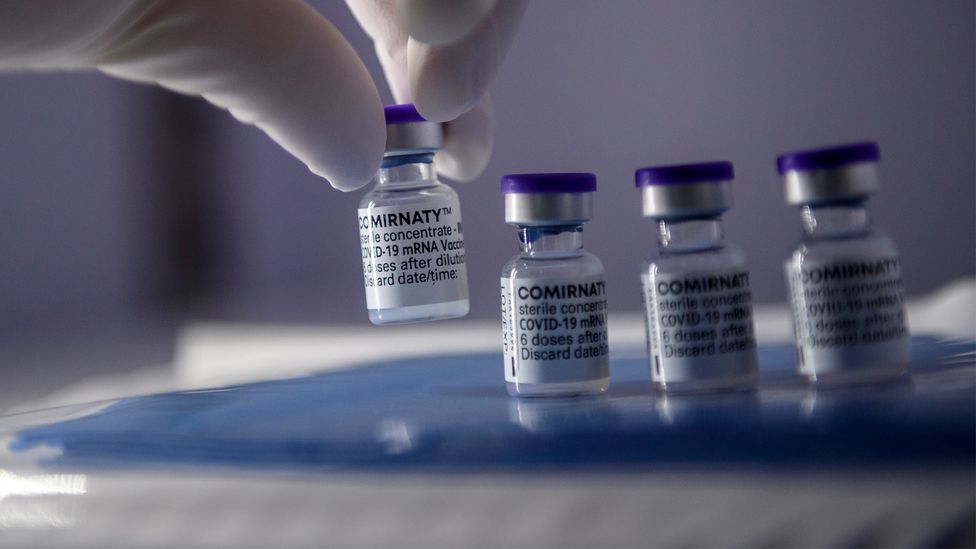Evading SARS-CoV-2 Infection
"It is always dangerous to predict science. [But Britain is heading toward a] safer haven.""I anticipate we will have polyvalent vaccines, which will cover a much wider range [of viral strains].""[These, together with antivirals], will mean that the great majority and probably almost all of the heavy lifting when we get a new variant can be met by medical means."Professor Chris Whitty, Chief Medical Officer, Britain"The holy grail would be a vaccine that works for all different variants because they've found an area of the virus which is stable, and which causes the immune response to occur.""Then you'd have a good vaccine which could prevent future variants."David Heymann, professor of infectious diseases, London School of Hygiene and Tropical Medicine
 |
A dilemma has presented itself -- not that it couldn't have been foreseen -- whereby the vaccines that were developed against the SARS-CoV-2 virus causing COVID-19 have been highly effective, in protecting hundreds of millions of people worldwide from infection as the virus runs rampant throughout the global village, the emergence of new variant strains have challenged the ability of the vaccines to continue providing the same level of protection from a variant strain now eluding the vaccine's protective properties.
The vaccines currently in use have been responsible for protecting people from the development of more serious illnesses from the coronavirus. But suddenly that protective edge is evaporating in the face of a more virulent, infectious, more readily transmissible mutation. The current vaccines focus on the "spike protein", but as mutations develop the vaccines based on making them less proficient entering body cells become themselves neutered of their protective edge as the virus 'learns' to evade its properties.
A situation which leads to hope that science may again find a solution. Researchers are optimistic that a "universal" coronavirus vaccine solution should be possible. Nations' top medical advisers, like Dr.Anthony Fauci of the U.S. have been counselling scientists to "fully commit" to the development of next-generation vaccines that could "ideally protect against SARS-CoV-2 as well as many other animal-derived coronaviruses certain to cause future zoonotic outbreaks and pandemics".
This is not a simple and easy-to-achieve goal. A universal flu vaccine, as example, has been examined for years and still evades all attempts by researchers in its development. As for the goal of tackling coronaviruses, a shift in how vaccine makers design their vaccines is envisaged. As a target the "spike protein" may have outlived its purpose, given the ongoing opportunities for the virus to mutate, resulting in their being less effective against future strains.
The aim would be to target other parts of the virus ... such as proteins that would be less vulnerable to mutations, for the next generation of vaccines. The $65-thousand question then would be how to identify which part or parts of the virus could be depended on to remain as is without mutations occurring. Scientists around the world are bracing themselves in the effort to develop such an all-purpose vaccine.
A startup based in Oxford and Helsinki -- Valo Therapeutics -- is testing its formula on mice; a vaccine that would cover parts of the virus known not to mutate in proteins and that would work by recognizing and destroying any proteins that would be infected with a COVID strain. "We could be in clinical studies next year", chief executive Paul Higham explained.
Experts at the California Institute of Technology are at work on taking the tips of spike proteins from eight coronaviruses to attach them to a particle. to then form the basis for a vaccine. Osivax, a French company, is in the development stages of a vaccine targeting a protein in the virus known as nucleocapsid; which the company claims could be available in five years.
U.K. vaccine czar Sir John Bell is less sanguine about the prospect of universal vaccines appearing any time soon; his opinion is that eventuality is yet "a long way off". And he has the support of the former chairman of the U.K. vaccine task force, Clive Dix, who argues that companies have been claiming they could develop such a flu vaccine "since I was a little kid and that was a long time ago".

Labels: Coronaviruses, COVID Super-Vaccine, Mutations, Research

0 Comments:
Post a Comment
<< Home